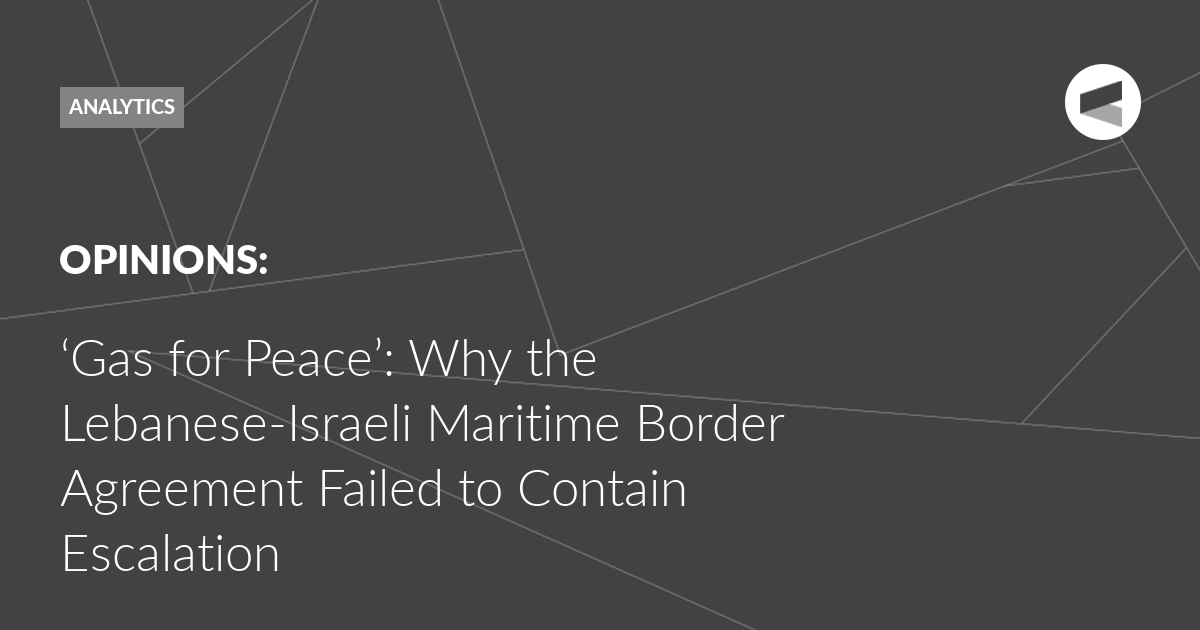Two incidents involving the detonation of communication devices, the liquidation of the Hezbollah Secretary General, and the IDF’s operation Northern Arrows most aptly reflect the situation on the Lebanese-Israeli border over a period of just over a month. Against this background, the “historic” agreement on the demarcation of the maritime border, signed two years ago and designed to pave the way for reconciliation between the two warring states, has remained in the shadows. The reason for such inattention could be a complex array of foreign economic and domestic political factors that have predetermined the inability of the deal on the division of gas fields to contribute to preventing escalation.
On October 27, 2022, work on the Lebanese-Israeli maritime border agreement was completed. However, the signing ceremony was conducted indirectly by then Israeli Prime Minister Yair Lapid and Lebanese President Michel Aoun, despite the accompanying media coverage. This showed that the countries were still far from resolving their deep-seated differences. The second sign of the confrontational nature of the relationship was that the parties actually reached agreements not between themselves, but with the United States, which assumed the function of a mediator.
The key points of the deal were Lebanon’s agreement to demarcate the maritime border along so-called Line 23, with the transfer to Israel of the Karish gas field, the ownership of which Beirut had previously intended to challenge. In exchange, Lebanon received the Qana field on the condition that Israel would get a share of the royalties for its development, although the amount of the latter was not specified in the text, as it was considered the subject of a separate agreement with the operator of the field. Moreover, Beirut and Washington refused both responsibility for the outcome of these negotiations and the obligation to compensate the Israeli side for possible losses. The only insurance could be considered the guarantee that Iran wouldn’t-participate in the project to develop all of Lebanese block 9, hidden behind the ban on the involvement of a company under international sanctions, cooperation with which would threaten interaction with the USA.
It was also not possible to achieve full agreement on the border demarcation. If line 23 was recognised as permanent, then the so-called line of buoys in the form of a 5-kilometer strip laid from the shore corresponding to the original Israeli territorial claims was determined by the status quo, with the possibility of further revision at the stage of negotiations on the land border.
The remaining deep contradictions and the vagueness of the wording of the text of the deal on gas fields, of course, contributed to its inability to influence the dynamics of Lebanese-Israeli relations over the past period, although the main role here was played by domestic political circumstances and the final economic benefit for each of the participants. In the spirit of the theories of economic peace, which the US tried to implement in its dealings with the Palestinian Authority, it was supposed to motivate Lebanon to change its perception of Israel through the chance to extract income from the production of “blue fuel” and thereby stabilise the socio-economic situation in the country. However, the characteristics of the fields that were the subject of disagreement prevented the implementation of this scenario in practice.
The Qana field, which was slated to be administered by Beirut, did indeed have more significant projected reserves. At the stage of signing the agreement on the maritime border, they were estimated at 100 billion cubic meters of gas, while the Karish field was generating only half this, and therefore, taking into account the other points mentioned above, the agreement was positioned as more advantageous for Lebanon politically and economically. In addition, the text emphasised the prospects of the entire Lebanese block 9, the intensification of the development of which was expected against the background of the agreements with Israel.
However, the plan for developing of the Karish field was prepared back in 2017 and its implementation was hampered not so much by the long-standing dispute with Beirut as by the Covid-19 pandemic. Test drilling at the Qana field was only carried out in 2023. As a result, Israel was the first to benefit, followed by Egypt and the EU, which signed a memorandum of understanding in June 2022 on the sale and transportation of gas to Europe. It is important that the Karish field was taken into account when determining Israel’s export potential, which was taken into consideration when the document was drafted, although the risks of escalation with Lebanon raised certain questions about the project. After the start of the war against Hamas, the field also provided certain help in covering domestic needs and fulfilling obligations to partners due to its vulnerability to attacks from the neighbouring Tamar field, where production was temporarily suspended.
The Lebanese part of the agreement, on the contrary, did not lead to the quick extraction or the promised profit, and the new round of the Middle East conflict even provoked a short-term decline in interest from the largest energy companies, which were motivated, apparently, by security considerations, despite trying to maintain a presence. Thus, in October last year, TotalEnergies reported an unsuccessful drilling test in block 9, while simultaneously submitting applications for the lease of sites in neighbouring areas directly adjacent to the border fixed in the deal with Israel. The domestic political background of the agreement has also noticeably changed over the past two years. On the Israeli side, it was concluded by Yair Lapid, who sought to speed up the process by any means necessary in order to achieve a foreign policy breakthrough before the next early elections that were coming up at that time. For this reason, he even found a loophole to bypass the referendum law, which has constitutional status and provides for a similar procedure for any territorial concessions. In pursuit of electoral support, the now-opposition politician also promised to uphold the country’s security interests, including the separation of Lebanon from Iran under the influence of the economic benefits obtained by Beirut.
Current Prime Minister Benjamin Netanyahu was among those who were sceptical of the agreements on the maritime border with Lebanon from the very beginning, arguing that they would strengthen Hezbollah, allowing it to improve its image in the West, while simultaneously buying time to prepare an attack on Israel. At the current stage, due to the likelihood of another snap vote, it is inappropriate for the Israeli government to bind itself to obligations arising from the decisions of political opponents, and therefore the country’s Energy Minister Eli Cohen has already proposed cancelling the deal on the division of the gas fields. In the future, Netanyahu may try to use the agreement in a campaign against the opposition, along with Yair Lapid’s Operation Breaking Dawn in August 2022, which was demonstratively aimed at the Palestinian Islamic Jihad but did not affect Hamas.
For Lebanon, the agreement with Israel came at a time of protracted government crisis, in which it was important for Hezbollah to defend its political positions, albeit at the risk of eroding the ideology of resistance. It is possible that for this reason that Hassan Nasrallah agreed to change the “red line” to “line 23”. However, his elimination may again shift priorities to the fight against the neighbour and in the gas sector, since the concession did not save either from escalation or from the targeted elimination of the leader, and therefore is not beneficial to his successor.
Finally, the US administration at that time was in dire need of a breakthrough in the Middle East, as it was experiencing pressure from the success of its predecessors in the form of the Abraham Accords. Moreover, a likely side effect was seen as preventing the return to power of Benjamin Netanyahu, with whom the Democrats had serious disagreements back during the presidency of Barack Obama. In the current circumstances, the favourite in the Israeli domestic political struggle has changed, depriving Washington of grounds to recall the Lebanese-Israeli agreements for such reasons. The agreement on the maritime border was replaced by the September initiative on a 21-day ceasefire between Israel and Hezbollah, and Benjamin Netanyahu’s rejection of it has affected the pre-election situation in the United States.
Thus, amid the current regional realities,
agreement on the maritime border is becoming less and less advantageous for
Lebanon and Israel. In a broader sense, this example illustrates the fragility
of situational agreements concluded primarily for the political reasons of
their immediate parties and the mediator, but it is precisely this scenario
that is quite capable of repeating itself both in the framework of a new
attempt to resolve the Lebanese-Israeli contradictions and the crisis in the
Gaza Strip.
The Valdai Discussion Club was established in 2004. It is named after Lake Valdai, which is located close to Veliky Novgorod, where the Club’s first meeting took place.
Please visit the firm link to site






